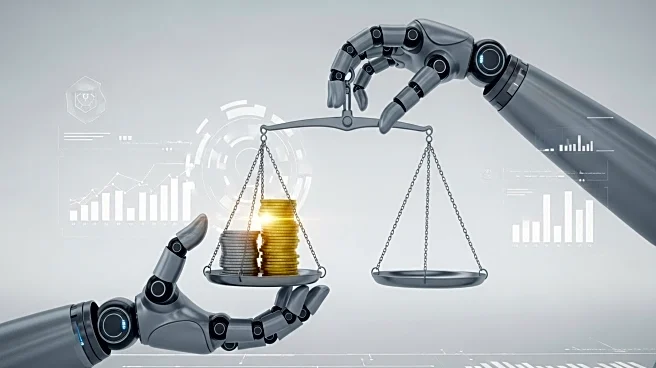What's Happening?
Geoffrey Hinton, a renowned computer scientist often referred to as the 'godfather of AI,' has expressed concerns about the impact of artificial intelligence on employment and economic inequality. In an interview with the Financial Times, Hinton predicted that AI will lead to significant job losses as companies replace human workers with AI technologies. He attributes this potential rise in unemployment not to the technology itself but to the capitalist system that prioritizes profit over people. Hinton, who recently left Google, has been vocal about the potential risks and benefits of AI, emphasizing that while AI could enhance efficiency in sectors like healthcare, it also poses risks if used irresponsibly. He has also criticized the idea of universal basic income as a solution to job displacement, arguing that it does not address the human need for dignity and purpose derived from work.
Why It's Important?
Hinton's warnings highlight a critical debate about the future of work and economic distribution in the age of AI. As AI technologies become more prevalent, industries may face a paradigm shift where efficiency and profit margins are prioritized, potentially at the expense of the workforce. This could exacerbate economic inequality, with wealth concentrating among those who own and control AI technologies. The discussion also touches on the ethical responsibilities of tech companies and governments to manage AI's societal impact. Hinton's insights urge policymakers and business leaders to consider regulatory frameworks that balance innovation with social welfare, ensuring that AI advancements do not disproportionately disadvantage certain groups.
What's Next?
The conversation around AI's impact on employment and the economy is likely to intensify as the technology continues to evolve. Policymakers may need to explore new economic models and regulatory measures to mitigate potential job losses and ensure equitable distribution of AI-generated wealth. Additionally, there may be increased pressure on tech companies to adopt ethical AI practices and invest in workforce retraining programs. The debate over universal basic income and other social safety nets may also gain traction as potential solutions to the challenges posed by AI-driven economic changes.
Beyond the Headlines
Hinton's comments also raise broader questions about the role of AI in society and the ethical implications of its deployment. The potential for AI to be used in harmful ways, such as creating bioweapons, underscores the need for international cooperation and regulation. Furthermore, the discussion about AI's impact on human dignity and the value of work invites a reevaluation of societal values and priorities in the digital age.









